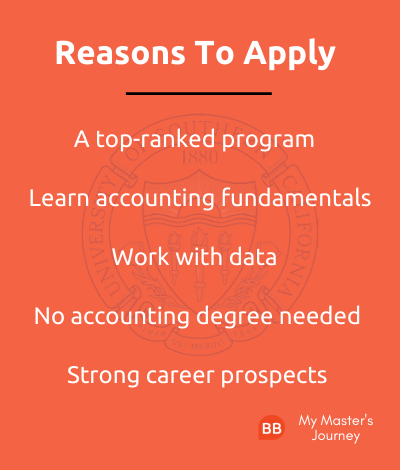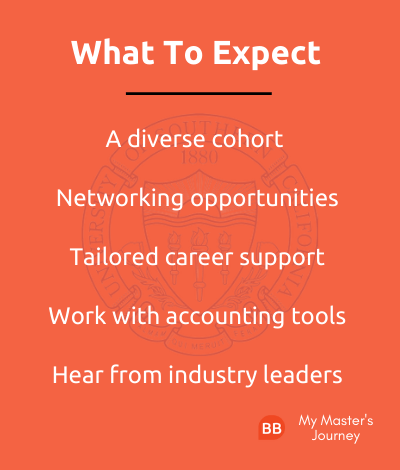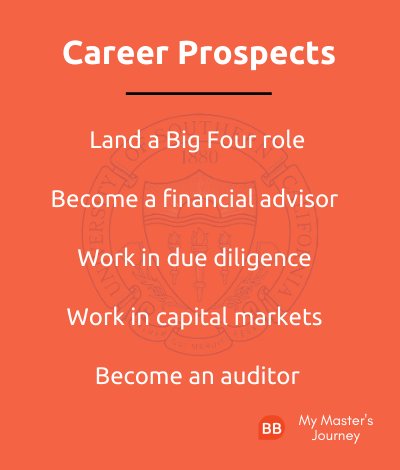The Master of Accounting (MAcc) offered by USC Marshall's Leventhal School of Accounting is consistently ranked among the top 10 programs in the US by US News.
The one-year, full-time Master in Accounting is based in Los Angeles, California. Each year, around 170 students enroll, taking courses ranging from ethical principles to data analytics. They can also choose to specialize in subjects like business taxation.
But what’s it really like to study on USC's Master of Accounting? BusinessBecause spoke to Alex Philogene, and Cierra Roufosse, two current USC MAcc students, to find out.
Why the USC Marshall Master of Accounting?
Alex always had a mind for finance. After specializing in finance during his bachelor’s in business administration, he began his career as an operations manager, but quickly switched tracks to entrepreneurship.
His home decor company, Havenia, started out strong, but when sales dropped off during the pandemic Alex jumped at the chance to take a break from the business and upskill.
“Getting a master's degree in accounting would help me understand accounting a lot more deeply, so I could administer my business more effectively,” he says.
After speaking to a friend who completed the USC Master of Accounting, he started looking into the school. Alex was impressed by its consistent ranking as a top school for accounting, and also realized that its location in Southern California was a hotspot for commerce. In fact, many of the suppliers for Havenia were located in the region.

Cierra took a different route. She started her career working in finance as a portfolio administrator, having completed an MBA from Azusa Pacific University in California. But Cierra soon realized that the role didn’t align with her long term career goals.
“I preferred the data side of things,” she explains. Happy there was plenty you can do with a Master in Accounting, she decided that was the best option.
“Previously, I thought I’d need an undergraduate background in accounting to pursue a master’s, but Leventhal offers a summer intensive that gets you up to speed,” she explains.
During the eight week intensive program, Cierra met students from a diverse range of non-accounting backgrounds, including a biologist and a hotel manager.
USC MAcc: What to expect?
For both Cierra and Alex, classroom diversity is a real highlight of the USC Master of Accounting. Students in the program come from a range of different nationalities—including Chad, China, and Canada—and the class is 15% female, and 19% students of color.
“You get exposed to an enormous variety of people,” Alex comments. “You learn that you can’t judge a book by its cover.”
For Cierra, building this broad network was especially advantageous. As a first generation college grad, she felt that some of the connections she needed to succeed in the business world were missing from her network.
“I now have people who can be my mentors, and feel like I can reach out to any USC graduate in the accounting field,” she says.

Professors were equally supportive, she reports, making time to speak with students one on one about their career goals and how to achieve them.
A module in enterprise resource planning (ERP) systems has been another program highlight. In the class, students learn to work with ERP systems from a financial point of view.
“We’re also learning to work with tools like Tableau, and how to build databases,” Alex adds. Tableau is a data analytics platform.
Both Cierra and Alex are also looking forward to modules that approach topics through the lens of a CFO.
“There’s a class that’s specific to Leventhal, which examines strategy and operations from the CFO lens,” explains Cierra. “They bring in regular CFO speakers, and many are alumni from the school.”
One speaker who often comes to campus is the CFO of the Walt Disney Company, she adds.
What careers can you expect after graduation?
USC Marshall MAcc graduates typically go on to fulfilling accounting careers in several areas, but one of the most popular routes is to join one of the Big Four accounting firms—KPMG, PwC, EY, or Deloitte.
This is exactly what Alex plans to do when he completes his program.
“I want to build my business acumen, sharpen my skills in accounting, and build my network for a few years,” he says. “After that, I’m keeping my options open.”
USC Marshall has a strong network of grads working across the Big Four, and according to Alex and Cierra, alumni are keen to connect other students and answer any questions about their work.
“The alumni network here will really move mountains for you,” Cierra emphasizes.
Students in the MAcc program also have access to specialized career advice through the Leventhal School of Accounting, offering several kinds of career support.

“Career services have been so supportive helping me tailor my résumé, connect with mentors, and helping me pick electives that will help me achieve my goals,” Cierra explains.
After graduation, she plans to enter an advisory role, in either capital markets or financial due diligence.
In securing a post-graduation role, she thinks the interpersonal and communication skills she’s building will be an important addition to her new technical knowledge.
By delivering presentations and case studies in a team, she’s been able to practice relaying complex information in an accessible way.
“It’s important not only to be technically knowledgeable in the field, but also to explain things in a way that executives without an accounting background can understand,” she notes.
Wherever their career takes them, Cierra and Alex feel well-equipped by the USC Marshall Master of Accounting program.
“For anyone considering going to Leventhal, you can’t go wrong here,” Alex concludes.
Next Read:
Cambridge Master Of Accounting Review | Curriculum, Class Profile & Application


